Saturday, 01 March 2025
Organic supermarkets may introduce a larger audience to sustainable organic produce and thus spare the environment, but do not necessarily help to reduce the amount of one-way packaging, save plastics. As a conscious consumer you will without doubt prefer non-prepackaged fruit and veges, available from all organic groceries, supermarkets and market boothes, and hand your bag over the bakery counter, making it verbally clear that you do not need a paper bag, to avoid paper waste when buying bread and rolls.
You're also safe if you restrict your shopping of dairy products, juices and soft drinks to returnable glass bottles. Some organic shops (such as Vollcorner) offer a small selection of wine in deposit bottles. Since 2021 we also have seen the gradual arrival of dry food, preserves and spreads in returnable glasses formerly only used for yogurts.
Starting in 2017 the more dedicated organic supermarket chains have been introducing measures to reduce packaging and allow customers to bring their own containers to fill with selected goods.
Unless stated otherwise all shops mentioned in this post will help you out with clean and empty reusable glass jars or organic cotton bags which you – depending on the shop – can either buy or lend if you forgot to bring your own.
Package-free food and household necessities
Early in 2016 the city's first crowd-funded vegetarian zero-waste supermarket Ohne ("without") opened its doors, followed by a
second branch early in 2019. End of June 2023
this became history: The insolvency, following the closing of other independent
owner-run package-free supermarkets earlier that year, left the Eastern,
Northern and central neighbourhoods without a place to effortlessly replenish
store cupboards without producing package waste.
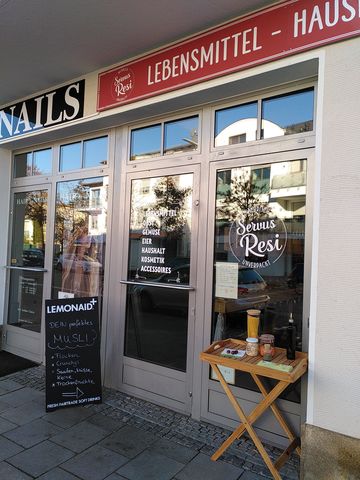
Gone the days of the pandemic spring and summer of 2020 when zero-waste groceries were blooming in town: Approximately at the same time as the Westend got its (now closed) neighbourhood shop, Servus Resi opened in Obersendling right before the lockdown in March 2020, in a non-descript middle of no-where near the Siemenswerke former industrial area. Don't let you fool by the uninviting environment at a noisy car road – what you'll find here is a busy neighbourhood gem nicely furnished in light wood, with a superb selection of dried herbs and spices aside the usual dry food, and a nicely arranged selection of household items. The greengrocery section is rather limited – local organic apples and potatoes in late autumn 2020 –, and there are no dairy or other food requiring cooling, but the shop offers both, liquid body care products and household chemicals from refill stations. Everything is supervised by the friendly shop-owner, Chrissy (not Resi) herself, and if you wish to get in touch with people from the neighbourhood take the burden to come here even from other parts of town.
In Laim Nebenan unverpackt ("package-free next door") followed in summer 2020. The latter is organised as a co-operative (though the location next to a co-operative bank is purely accidental) and sports a
small neighbourhood coffee place. They offer a very good selection of dry food, fresh fruit and veges, but less dried herbs and spices and no spirits. You can however buy wine and their selction of condiments and preserves in one-way glasses have the effect that you can do all the regular daily shopping here in one place if you don't come with more advanced expectations.
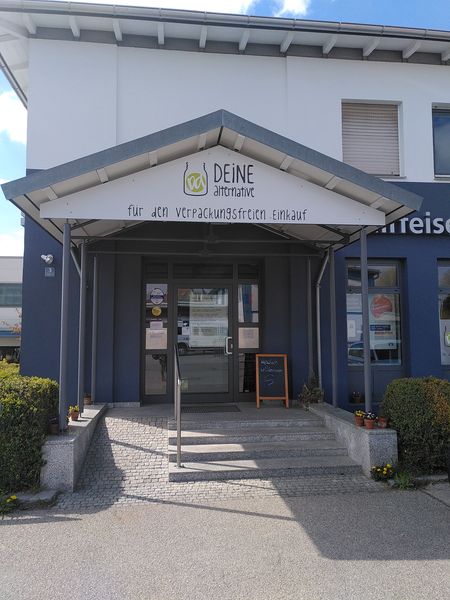
Half a year earlier, in January, 2020 another
co-operative, Deine Alternative ("your alternative") in Zorneding, opened on the premises of the former Raiffeisen co-operative bank, just a few steps from the urban train station.
When you get inside you will however immediately forget about its past as a bank, the shop is carefully and pleasantly decorated, with wooden furniture and equipped with a proper Italian coffee machine for a break in between. Most of the often local produce sold here is organically certified or at minimum sustainably produced, though it would be nice if conventional loose-weight products were clearly marked. In addition to the gravity bins and containers with dry food there's a decent selection of dried herbs and spices, sweets, bread, some confectionery, a small selection of fresh organic greens and veges, cheese and milk from the Nirschlhof organic farm (but interestingly enough no whole-meal flour or oils, vinegars or spirits by the litre). In a separate room you can buy toiletries, household chemicals and items supporting a zero-waste lifestyle. Everyone is welcome, but members of the co-operative pay less.
North of Zorneding, in the municipality of Poing, the co-operative
Bunte Bohne ("coloured/colourful bean") with its zero-waste supermarket cum cafe has been surviving hard times, but starting March 1st, 2025 every first Saturday of a month the place turns into a evening open bar where you can mingle with locals.
The neighbourhood of Trudering (a more than 1200 years old former village and suburb in the Eastern part of Munich) does not have a dedicated zero waste supermarket, but twice a month, on Tuesday afternoons, an indoor farmer's market dubbed Tante Trude ("Auntie Trudie") keeps popping up in the neighborhood associations' offices. Organic farmers offer local produce, and you can donate to the Trudelade project: home-cooked jam made from abandoned fruit trees in the neighbourhood (you'll get a jar as reward).
South-South-West of Munich, the city of Wolfratshausen (the endpoint of the S7 urban train) likewise sports a package-free shop centrally located at the Obermarkt market place: Ohnverpackt, another zero-waste shop opening within the corona lockdown in the spring of 2020,
is even certified organic. The few conventional products of regional origin are clearly marked as an exception. It does not only offer the usual dry food and household chemicals, but also a good selection of cheese and antipasti. What you won't find are fresh fruits and veges, meat and sausages.
There's a small day cafe, unfortunately all closed on Mondays.
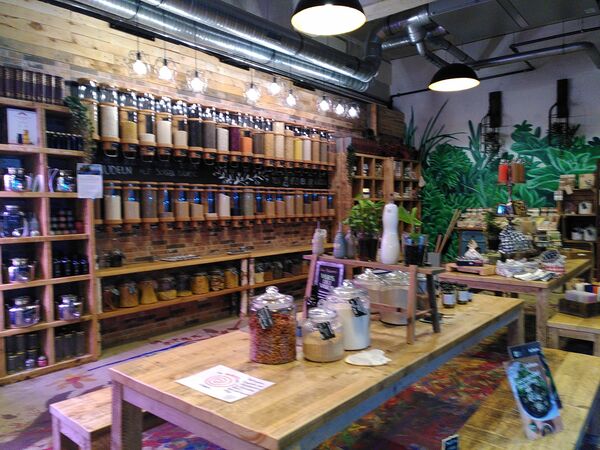
South of Munich, directly located at the S-Bahn station of Neubiberg the owner of the conventional Edeka supermarket opened a side project next door,
Hertscheck Unpacked. Unfortunately the separate organic shop concept did not survive, but is being continued as a shop-in-shop inside the conventional supermarket.
For city dwellers the place may be a destination on
a bicycle ride through the beautiful eco park Umweltgarten Neubiberg where an organic farmer's market is held on Thursday afternoons. Fun fact: The former premises of the Edeka supermarket now host a Vollcorner organic supermarket.
In smaller municipalities, (urban) train stations usually are the only public (and sustainable) transport hub and as such a natural place for zero-waste supermarkets. So I was glad to find a new (in 2022) co-operatively organised organic zero-waste supermarket in Unterföhrung, next to the S-Bahn train station. The shop dubbed
UFG (short for "unverpackt, fair, gemeinsam" – "unpacked, fair, together")
is open to everyone, with a 10 percent discount scheme for members.
It does not only offer dry food, condiments and household items, but also bread, rolls, cakes, dairy products and fresh, predominantly local fruits and veges. On Thursday afternoons you also may buy local organic meat and sausages, cheese and other fresh artisanal organic products from a mobile booth of the Tagwerk co-operative.
There's a small lunch cafe offering organic soups, quiches and sandwiches as well as cereal bowls, coffee, smoothies, tea and cake, all vegetarian, often vegan. Unfortunately you have to register with an app service to take your food with you in a returnable bowl or box, and nevertheless may have to come back to the shop to return it. So better bring your own boxes.
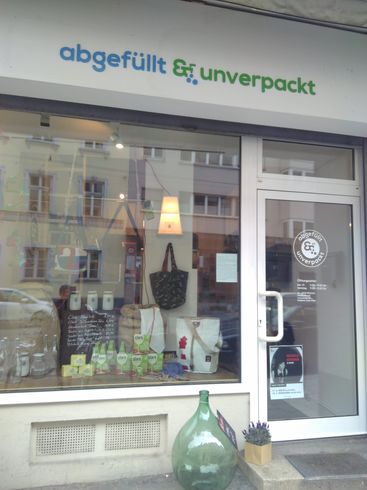
Plastic-free household
In March 2019 a tiny neighbourhood shop specializing in natural home cleaning opened in the Glockenbach neighbourhood: At Abgefüllt & unverpackt ("bottled and unpacked") the singer of the Munich-based band "Cat Sun Flower" warmly welcomes customers and passers-by and helps to (re)fill empty bottles with organic liquid household detergents. At the time of writing this shop was the only one in Munich selling washing powder by weight. In addition there are eco-friendly dishwasher tabs, body and hair soaps, fairly traded natural facecream in returnable glasses, towels, as well as upcycled and fairly traded bags and toiletry accessories.
Supermarket chains
In autumn 2016 the local Vollcorner
supermarkets received an official permit by the Munich Department of Public Order (Kreisverwaltungsreferat) to fill customers' jars and boxes with
cheese, antipasti, processed meat products or cake. Most independent convenience stores will also do this on request. Vollcorner, Lebascha and others provide jars, usually for a deposit. So even if you forgot to bring your containers, take your courage and ask!
The Herrmannsdorfer groceries (e.g. the one at Max-Weber-Platz) even reward you with a few cents discount per saved packaging.
To avoid misunderstandings it is advisable to clearly point to your box (or ask for the deposit container) before placing your order at the sales counter and tell the staff to tape the receipt to it.
The shops of the nation-wide operating Alnatura chain never offered refill dispensers. However, it has been increasing the range of products in returnable jars and bottles continously since 2021 – among others fairly traded nut butters, a number of dry products and even ketchup.
A small selection of dried fruits and nuts in refundable glasses as well as package-free toilet paper can be obtained from Vollcorner supermarkets. Their huge flagship store at Theresienwiese (with butcher's counter and lunch cafe) also experimented with a milk vending machine and a dedicated shelf offering all sorts of products in deposit glasses, but both efforts were discontinued due to low customer demand.
By the end of 2020 a number of conventional supermarket chains had introduced refill stations for dry food, too, but since you still have to do a lot of careful reading in front of the shelves to shop climate-friendly products, I won't mention them here, with one exception: the huge Tegut branch that opened in the Elisenhof shopping centre next to the main train station
in December 2020. This supermarket chain gives their customers a choice – all organic products are easily to recognise thanks to a light-green label on the shelves, and there's a great number of them in all product categories. Given the sheer number of products on sale the impressive refill rack at the left-hand side of the entrance aisle comprises only a negligible fraction of total sales, but it's a good start, and the best: All products in the gravity bins are organic. Come here for the biggest selection of package-free organic chocolate-covered sweets I've come across so far. There are grains, cereals, nuts, dried fruit, legumes and sweets, but no flour and surprisingly almost no pasta.
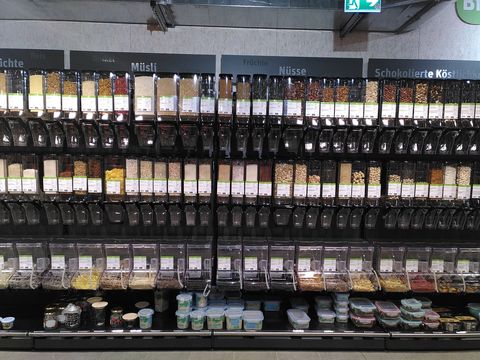
Although the supermarket has its entrance in the Hauptbahnhof basement Tegut is closed on Sundays and public holidays as well as in the evening. When you have at minimum half an hour to change trains you will however reach to refill some of your dry food containers as long as you know how it works: Put your box onto the scales and choose "Tara-Bon". This will print a label. Fill the box and remember the product id on the lower end of the gravity bin. Put the filled box back on the scales and press the second "Bon" button beneath the "Tara-Bon" button. Now you will be asked to type in the product id. Scan the bar code on the previously printed label with the hand scanner, and there you go: A receipt with a price tag will be printed for you. Seal your box with this second label and hurry up to the cash counter.
Until the end of 2022 Basic supermarkets had gravity bin dispensers for pasta, nuts, dried fruit, sweets, grains and more which all disappeared in the course of the company's
insolvency and take-over by the "teGut" chain. Package-free offerings at the remaining "Basic" branches are reduced to fruits and vegetables as well as food from the serviced bakery and butchers' counters.
Neighbourhood groceries
In Haidhausen the Lebascha neighbourhood grocery has been offering to fill all loose-weight products (cakes and bread, eggs, cheeses, olives, jelly gums and liquorice – note that the latter is not organic) in bottles, jars and boxes customers brought along. When the shop was taken over by the Ökoesel co-operative dispensers for grains, nuts and the like as well as household chemicals were added, and you can
buy all types of dried herbs and spices by the gram.
Ask for a deposit box in case you forgot to bring your own.
For home-made dried fruit stroll a few more steps down the street and see whether the Haidhauser Oase is open (which however is rarely the case).
Household chemicals can be refilled at the Echt Bio Markt in Neuschwabing.
In Harlaching, the
independent Biowelt supermarket has a small zero-waste corner with dispensers for dry food, a good selection of loose-weight dried fruit and a dairy and butchers' counter where you can hand over your containers.
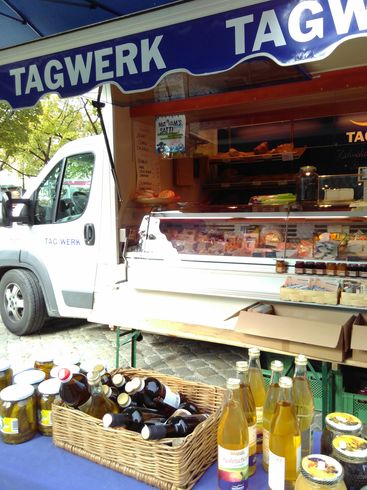
Farmers' markets
Once, sometimes twice a week farmers' markets are installed in many Munich neighbourhoods. Loose fruits and veges prevail here, and boothes selling organic produce (watch carefully for "bio" and "demeter" logos) will usually fill bread, cakes and pastries, antipasti, meat and dairy products into the containers you present. Notably at the boothes of the Tagwerk co-operative and the Hofbäckerei Steingraber you may be surprised to see that you're not the only one coming with her own boxes and jars.
On Saturday mornings you can find them next to the West-facing entry of Mariahilf church, in the neighbourhood of Au. Before the covid-19 pandemics all boothes (except the French fish monger) in the market block next to the church, right below the carillon, were organic,
but now it's no longer that easy. Therefore a comprehensive list: There are three organic market gardens (Biogärtnerei an der Isen alias Avanti Andi, Demeterhof Fahrenzhausen alias O'is bio and a third one also selling flowers and seedlings which you will immediately recognise when greeted with a friendly French accent). Put differently: Simply avoid the biggest greengrocery booth, "Helminger".
For meat, sausages, cheese and other dairy products there are the aforementioned two producers, and in addition the farm sale of Bergwinklhof Monigottsöd. The latter also offers a small selection of wine, but for good and knowledgeable advise on wines or non-alcoholic drinks to accompany a meal you'll better pay a visit to Uli Scheffler's organic wine trader's booth. While the juices are readly available in deposit bottles, returnable wine bottles are still very rare, and not used for high-quality wines.
If you feel adventurous on Thursday afternoons take the urban train S7 in direction Aying/Höhenkirchen-Siegertsbrunn/Kreuzstraße (or a bike ride) to the suburb of Neubiberg and pay a visit to the communal organic market on the pleasant premises of the Umweltgarten eco park, a true oasis within ugly suburbanity, with a small zoo, popular not only among kids. On Thursdays there's also an all-day market at Rotkreuzplatz. As on Mariahilfsplatz about half the boothes here are organic, though scattered all over the market area, with a cluster in direction Nymphenburger Straße.
Needless to say that the organic boothes on the famous Viktualienmarkt in the Munich city will happily support you when you make it clear that you want to use your own bags and containers. And the spring of 2021 did not only see the opening of an organic bakery in one of the solid market stalls in the northern part of the market, but also a tiny organic food shop for organic dry food grown and produced in the nearby Chiemgau region:
Satt und gut ("full and good") sells staple foods like grains, flour, eggs, honey and oil but also cookies, both pre-packaged and loose weight, partially from the smallest gravity bins I've seen so far. Note that this shop, unlike the market itself, is closed on Mondays
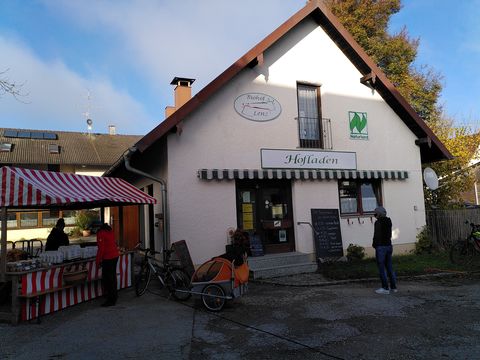
In Zorneding a small farmers' market is being held every Friday on the premises of the Biohof Lenz organic farm. Here you can buy local organic meat and meat products, cheese, bread, veges, and occasionally honey and bee products, wines and spirits. Although most stalls are organic there are a few exceptions offering conventionally produced specialities. The Lenz family's own farm shop keeps open at the same time and on Saturdays, but for buying their exceptionally good meat you should subscribe to their newsletter and order beforehand according to availability (you should be fast to answer). Unfortunately all the Lenz meat and sausages are vacuumized in plastic.
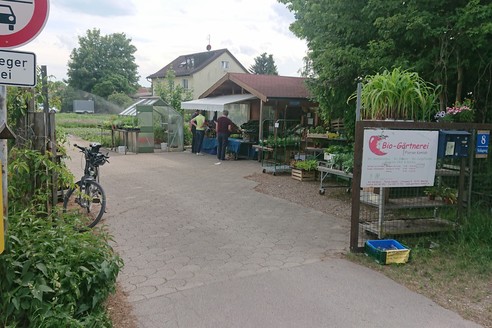
At the Western edge of town, in Pasing the organic market garden of Bio-Gärtnerei Kamlah has a farm shop open on Monday, Wednesday and Friday afternoons. You can not only buy salads and vegetables grown here but also organic seedlings for your balcony or garden patch. The farm has also a market stall at the Pasinger Viktualienmarkt which keeps open all days except Sunday offering a huge selections of organic fruit and veges, but no seedlings.
Tea shops
While coffee is readily available from
loose weight convenience stores, tea drinkers aren't well catered for: Usually you will find some tisanes and one or two types of black tea. Fortunately specialist tea shops still exist, and as they sell loose weight teas by the gram don't be shy and ask them to fill your tea box.
In the
Tee Gschwendner shop in the Asamhof backyard a few meters from the new pedestrian street of Sendlinger Straße this will work as long as the opening of your jar or box is wide enough for the shop assistant to fill it without touching it with her shovel. The franchise also sells conventional fare, so make sure to insist on organic quality – "Bio-Qualität" is the keyword. You'll find a decent selection of both, green, black and herbal teas, with and without aromatics. Bring a little time to stroll through the light and pleasant shop that has been at this place since the 1980ies, ask the assistant to show and suggest teas according to your taste and tell a little detail. When all your teas are filled into your jars you will be asked whether you fancy a tea sample, so it is smart to bring an additional small glass or jar.
Mind you that green tea doesn't store well in classic metal tea boxes as this material supports further oxidation processes.
In spring 2022 it turned out to be difficult to buy loose-weight organic flavoured tea as compliance to the EU regulation 2018/848 on organic products had not been established in time.
Coffee and food to take away
An increasing number of coffee places you may lend a Recup coffee cup for a deposit which you can return at any other shop participating in the retour scheme.
Some like the Neulinger bakeries will even give you a small discount for sparing the environment.
Most of the eateries reviewed here will fill your food into the boxes you provide for take-away as long as you make this clear before they start their usual routine which still means one-way packaging. Sushi to take away is available from Sushiya, and they will happily accept your bento boxes with your order.
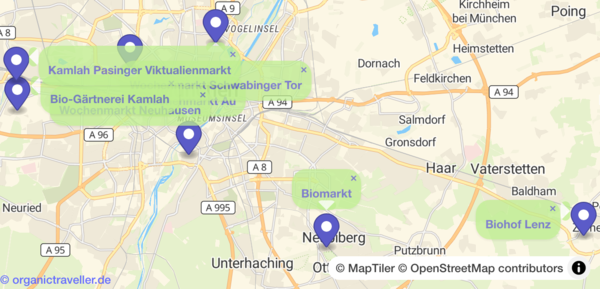
Closed
- Beauty & Nature, Westenrieder Str. 35 (organic fashion, household items and body care, with a range of refill and minimally packaged products; there's a branch left in Leipzig)
- Der plastikfreie Laden, Schlossstr. 7 (Munich's first zero-waste shop, also known as "Plastikfreie Zone", now online only)
- Mutternaturladen, Grünwalder Str. 244
- Mutternaturladen, Tumblinger Str. 45 (inside the Bahnwärter Thiel area
- Ohne, Schellingstr. 42
- Ohne Haidhausen, Rosenheimer Str. 85
- Naturverpacktes Westend Pur, Heimeranstr. 51a
- Evis – ab ins Glas, Pollinger Str. 11, Gilching
- Lela Lose, Freisinger Str. 3, Erding
2025-03-01 14:00:00
[Munich, Neubiberg, Erding, Gilching, Poing, Trudering, Unterfoehring, Wolfratshausen, Zorneding, Leipzig, Au, Haidhausen, Harlaching, Laim, Maxvorstadt, Pasing, Westend, organic, vegetarian, zero_waste, unverpackt, cafe, grocery, market, supermarkets, lunch, bakeries, butcher, tea, bodycare, household, sushi, wine]
[direct link · table of contents]

Thursday, 22 August 2024
Forget about sushi, pizza, pasta, burgers, curries and other globalized commonplaces – in Dresden it's much easier to find hearty home-cooked dishes made from locally sourced ingredients rooted in local and regional food traditions. This does not necessarily mean German – mind you that the borders with Czechia and Poland are close, so many menus reflect influences rather from Eastern than Western or Southern European cuisines.
Many dishes include meat, yes, but all the places I am covering here have a decent selection of tasty vegetarian options readily available.
Old town
A few steps from the Altmarkt, just across Kreuzkirche you'll find Cafe Aha which is covered here. Longer west, facing the modern building of the University of Music in Schützengasse you may be surprised to find a small island of baroque buildings with a wild garden, housing the city's environmental centre, and a great disappointment: The cosy rustic wholefood restaurant on ground flour dubbed Brennnessel ("stinging nettle") once used organic ingredients and still can be found listed as an organic restaurant, but alas! – no more.
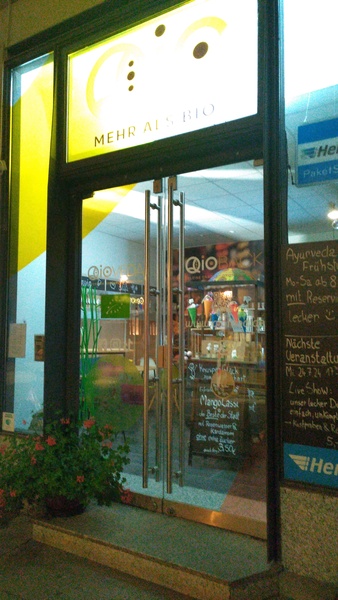
For a filling ayurvedic lunch or snack a few steps from the tram hub Pirnaischer Platz pay a visit to the
Qio bistro, in the vicinity of Cafe Aha. The place is a add-on to a small organic snack bakery – needless to say that you can buy their vegan sweet and savoury crackers made from legumes instead of wheat here alongside with a range of teas and other organic food items. On prior notice they also serve ayurvedic breakfast. So far I haven't had the opportunity to eat (or have a coffee) here, so let me know what you think.

Neustadt
For rustic food and surroundings head for one of the oldest independent pubs in town, the Planwirtschaft ("planned economy") in the Neustadt neighbourhood, popular since its beginnings as an illegal pub in the late GDR. On mezzanine level they serve breakfast, lunch and dinner as well as coffee and cake while the basement houses a pub which opens in the evening. When it comes to their supplies they focus on buying from local farms and enterprises as the (unfortunately not organic) independent butcher's directly across the street or a tea shop next door from which they also source the organic teas on offer. The goat cheese is always organic. They used to have an organic meat dish (which was marked as "bio" on the menu), but unfortunately no longer. My vegan dish of the day (celeriac in a hearty plum-fragranced sause with polenta and green salad) was absolutely tasteful. Have a tasty organic apple cider or beer, and ask about organic ingredients.

Young German kitchen is the promise of the Lila Soße ("purple sauce") gastro bar within the eccentric
Kunsthofpassage with its small boutiques and lovely places. Apart from daily changing main courses (most of them meat or fish, and often with an Italian touch) you can order tasty German "tapas" to your liking – warm, cold and sweet – served in a glass as well as dips and bread. None of the courses are fully organic, but many ingredients are, and chances are high that you can combine cleverly if you ask. They offer organic softdrinks, but no organic alcoholic beverages.
Out of town
If you take the urban train number 2 from the Neustadt train station, either on the way to the airport or to a stroll in the woods of Dresdner Heide, get off Bahnhof Klotzsche (one stop before the airport) and have breakfast, lunch, tea or a snack in its 110 years old railway station. Since the folks of Vorwerk Podemus took over and restored the historical building in 2015 it has been home to a bicycle shop, an artist's studio, an organic supermarket, and the now fully organic station restaurant dubbed Bio-Bahnhofswirtschaft with its pleasant beergarden.
Travellers and ramblers may be glad to hear that they can fetch an organic breakfast or packed lunch on the go, though
unfortunately not on Sundays as the restaurant is closed that day.

The vineyards on the slopes of the river Elbe around Dresden form Europe's smallest, most northern wine region, and fortunately the Saxon state winery of Hoflößnitz in Radebeul turned organic. The small town located west of Dresden on the northern shore of the river is famous for the writer of travel fiction, Karl May and its Museum of North American Indian Culture and can be reached easily, both by urban train, tram no. 4 and bicycle. Follow the Elberadweg cycle route on the southern shore, cross the bridge at Niederwartha and turn back east on the northern shore cycle route through Radebeul until you find signposts pointing to the vineyards on the hill.
The Hoflößnitz winery has a small self-service restaurant, the Hoflößnitzer Weinterasse, with an outdoor seating area shaded by horsechestnut trees from where you have a great view over the grapewines and the valley while tasting the local wines. All wines, but not all the food are organic: Your best choice is the "Winzerplatte" – home-made white bread with pickles, a little salad and a number of spreads of your choice of which the bread and the vegan spreads are organic.
There's also a small museum with information on all Saxon wineries and a wine shop where you can buy their products, mainly white and sparkling wines. Stick to Hoflößnitz for organic ones.
No longer organic
In 2012, when the
Mensa U-Boot ("submarine") on the campus of the Technical University on the campus of the Technical University was opened after major refurbishment work
it was re-opened as a fully organic students' refectory offering
one vegetarian and one omnivore meal at a very competitive price. All food and drinks at that time were certified organic. Unfortunately this is no longer the case in 2022: Given low frequent visits during the Corona pandemic the staff decided to not prolong their organic certification and turn to cheaper ingredients.
Closed
The following places ceased to exist, although you still may find references to them on the web:
-
Lilisou, Louisenstr. 58 (vegetarian, burgers, soups, curries)
- Lingner, Lingnerpl. 1 (German, international)
-
ElectricLotus, Louisenstr. 58 (vegetarian, ayurvedic, Indian)
- Abutheke, Alaunstr. 68a (Middle-Eastern)
- roots, Hauptstr. 35 (vegan fast food)
- Wurzelküche, Alaunstr. 11 (vegan)
2024-08-22 17:00:00
[Dresden, Radebeul, Elbe_cycle_route, Elberadweg, Neustadt, vegan, organic, coffee, lunch, dinner, snacks, restaurant, pub, wine, beergarden]
[direct link · table of contents]

Saturday, 27 July 2024
The good news: As long as your organic supermarket is equipped with a freezer (which applies to all exceeding the size of a corner shop) you will be able to find some frozen pizza, and even if you feel the urge while most shops are closed, don't dispair! But come on, who really wants to feast on frozen pizza?
Italian pizza
If a bar stool will do, head for Bartu in Schwabing, a short walk from Münchner Freiheit. It's actually an ice-cream parlour with a hole in the wall to a pizza kitchen. Gorgeous, 100% organic pizza, and if you are lucky enough to live no more than three kilometers away they also will deliver home.

Those living in the Neuhausen neighbourhood may do the same with Pizza Verde delivering by e-bike within a radius of two kilometers. The pizza of course tastes much better when eaten directly from the (Italian) pizza oven, either on a bar table or in the guest room cum wine shop next door which has a table for twelve. Book this table in advance if you plan to come in company, it's a pleasant place to chat away an evening. The impressive menu offers all the classics, in addition to seasonally changing specials and creations of the house. Among the latter is a delicate combination of gorgonzola cheese, pears and walnuts, a white pizza with lardo fat and olive oil and a delightingly hot pizza diavolo. Since all ingredients (and all drinks) are of high, purely organic quality, and the pizze made with great skill
(The pizza base is pleasantly thin and crispy made of dough that was allowed to rest for a minimum of 24 hours.)
it's hard to be seriously disappointed. Even the "Nutella" pizza for dessert (of course made with superior organic hazelnut spread) is palatable for those who are beyond thirty.
You may also have a classical tiramisu or panna cotta, or simply
step by for an Italian coffee shot.
If you prefer a livelier, more crowded place
there's a second, bigger restaurant in Schwabing, with an organic wine shop next door and pleasant outdoor seating. Also this place features an open kitchen, so you can watch the pizzaiolo at work.
Early in 2020 the neighbourhood of Sendling got a fully organic pizza restaurant: La Trattoria.
Bavarian Pretzel Pizza
Bavarian pretzels or "Bretzn", lye treated twisted crumpets, are arguably the favourite food in town, just watch out for prams, and you'll discover toddlers feastings on it everywhere! Every bakery will sell you a Bretzn smeared with butter (or margarine) for lunch, and as Munich citizens are mockingly considering their city the most Northern city of Italy, why not using this wonderfully salty dough as a pizza base and accompany it with the only organic beer brewed in town?

The
Haderner Bräu is a small, owner-run brewery. Wednesday through Saturday Marta, Thomas and their team open their pub where you along with the finest beer can feast on Bavarian antipasti, vegan "Brizza" ("Bretzn" + "pizza") and a sweet finish. As the place is located off tourist tracks and may be fully booked call in upfront.
Shut down or no longer organic
The following places can still be find on the web but forget about them: They do not exist any more or stopped serving organic food.
- Blizzeria, Berg-am-Laim-Str. 82a (Berg am Laim)
- Bozo & Loui, Pariser Str. 17 (Haidhausen, Alsatian Flammkuchen)
- Lo studente, Schellingstr. 30, daily 11–24 (does no longer offer pizza dough made with organic emmer wheat)
- Manouche, Valleystr. 19
- NineOfive, Herzogstr. 29 (Schwabing)
- Pasta e Basta Bio, Amalienstr. 87 (Maxvorstadt)
- Sicilia Naturkost, Altmühleck 1 (Altstadt)
- Sweekies, Wendl-Dietrich-Str. 4 (Neuhausen)
- Pizza Zodiac, Schulstr. 42 (Neuhausen)
2024-07-27 17:00:00
[Munich, Schwabing, Maxvorstadt, organic, fastfood, lunch, delivery, coffee, pizza, wine, Italian, Lebanese, covid, corona]
[direct link · table of contents]

Monday, 27 November 2023
To find a place offering at least partially organic meals, snacks or coffee isn't a big deal in Salzburg, and places like the Bio-Burgermeister are frequent tourist destinations. But there's more than just healthy organic fast food –
from pleasantly modernized Austrian bars over cultured beer spots to slightly esoteric day cafes there's a broad range of places to choose from. What you shouldn't expect are authentic restaurants offering elaborated international cuisines, but that's probably not what you are here for anyway.
Burgers
When you're hungry and don't know where to go head for the Bio-Burgermeister in the middle of busy Linzergasse pedestrian street. With its liberal opening hours (no closing day, open until 10 pm) and central location this no-frills burger grill is serving both, meat, vegetarian, and vegan versions, purely made with organic ingredients. The service is swift, the burgers and side-dishes fresh, crisp and tasty, and most of the soft drinks and the beer are organic, too (though you have to check the bottles for organic labelling). The hot varieties I would describe as spicy rather than hot, and they come up with interesting seasonal versions like the pumpkin burger with a pumpkin patty. For meat patties you can choose between medium-done and medium-rare. The place serves neither desserts nor coffee.
Unfortunately it has implemented bad habits of conventional fast-food places, too: It produces a lot of waste since the meals are served on cardboard one-way plates, and the staff is neither busy cleaning the tables nor refilling paper towels.

If the burgermeister is too crowded or you prefer to produce less waste a burger restaurant is just a few steps away: The Ludwig doesn't promise fully organic burgers, but organic patties made from organic beef, turkey or mushrooms, organic pulled pork and bacon.
In addition to burgers the place also serves salad bowls, desserts and breakfast (including organic eggs in a number of varieties). Among the drinks fruit juices and teas are organic.
Located in a pleasant backyard with a small fountain this cafe cum restaurant is also a much nicer place to spend time with friends or family – during the warm season on the spacious terrace, on rainy or cold days in the large urban-rustic dining room.

Austrian
The Urbankeller is not just a perfect address for a rustic meal accompanied by local organic beer, wine, juice or lemonade in the restaurant or a civilised drink at the adjacent bar. It also houses a stage for live acts – predominantly rock, jazz or experimental theatre, and the occasional crime play reading. Although the place is certified by Bio Austria not everything is organic. Fully organic dishes however are clearly marked with a green logo on the menu, and a good deal of the un-marked meat-based dishes (including nose-to-tail ones using offal) are served with organic meat (check for the "bio" keyword). Vegan and vegetarian options are also available. If you consider one of the typical Austrian flour-based desserts ("Mehlspeisen") make sure to come with sufficient appetite.
Schallmooser Hauptstraße where the Urbankeller is located changes its name to Linzergasse (or Linzer Gasse, the naming is not consistent) when it runs over into a pedestrian area towards the river Salzach. Amid its touristic jumble you'll find the Stadtkrug, a family-owned hotel and restaurant of old, with roots in the 14th century. The family runs an organic highland cattle farm north of Salzburg and serves the beef at the restaurant specialising in typical Austrian dishes. The farm has its own slaughterhouse on premise which allows the cattle to die as stress-free as possible within their known habitat. The chicken served in the Stadtkrug is also organic as are some hard cheeses and the ice-cream and other products made from sheep's milk. The breakfast at the hotel unfortunately is not organic.
Directly located on Linzergasse, almost down by the river, but nevertheless not a place that tourists will recognise at a first glance, the Innergebirg restaurant serves traditional Austrian mountain cuisine with local ingredients from the Pongau, the Pinzgau and the Salzburger Land areas. All the meat comes from the Rostatt organic farm (which also is a farm stay).
Note that the restaurant is closed on Sundays.
Another beergarden down in the old town is associated with the local brewery Die Weisse
specializing in weiss beer. They also brew one alcoholic and one non-alcoholic organic variety (watch out for the bio label) which nicely go together with a hearty Austrian meal – the beef here is
organic and you may ask the waiter for likely other organic ingredients. Of course there's indoor seating, too.

On the other side of the Salzach river September 2018 saw the opening of a new fully organic, predominantly biodynamic restaurant and bar opposite the museum of modern art inside the Mönchsberg cliff, the Humboldt, a pleasantly modernized version of an Austrian "Gaststube", with geometric dark-wooden interior, a light-and-steam installation serving as a fire place surrogate, green cushions, table-clothes made from felt, and a green-lighted bar. For lunch on weekdays you can choose between two set menus consisting of a soup or salad (your choice), and a vegetarian or omnivore main dish which come at 9 or 11 euros, respectively. In the evening the kitchen emphasizes on Austrian signature dishes like the Viennese Schnitzel (a delicate, crisp, yet melting dream), boiled filet ("Tafelspitz"), and pancakes ("Palatschinken") as dessert (which were quite unexceptional).
The menu clearly marks organic, biodynamic, vegan and vegetarian items and also lists the sources of all ingredients which usually are Austrian farms and producers, often located in the vicinity. In all drink classes organic options are available, and often you have no choice but to drink organic. The bar keeps open until late each day, making it the perfect place for an evening out, and there's outdoor seating, too.
Indian
Back in town, just a few steps from the Stadtkrug vegetarian fusion food with roots in the Indian cuisines has been served for almost 20 years at Spicy Spices. This pleasant eatery may not be the place for the romantic dinner but is a nice location for a chat with friends, accompanied by a healthy lunch, a coffee, chai and/or cake, all organic. You can also shop for their home-made spice mixtures, chutneys and pickles which make tasty gifts.
International
The second surviving organic restaurant of old also draws its inspiration from the subcontinent and East-Western fusion. The Heart of Joy is a vegetarian (vegan friendly), predominantly organic cafe cum eatery run by followers of Sri Shinmoy. The latter is openly presented which may not be your idea of the perfect surroundings for a recreational sip of coffee or an Italian, Austrian, oriental or Indian inspired lunch in this otherwise pleasant location. Students are entitled a ten percent discount, and breakfast on weekends is being served all day.
For a simple lunch or a piece of home-made organic cake you may also try the A* bar in nearby Auerspergstraße.
If you are near the main train station on a weekday during daytime the bistro Leichtsinn ("carelessness") is worth a try. You'll find it if you leave the train station in western direction via Südtiroler Platz and walk in southern direction along Rainerstraße parallel to the tracks until you reach Elisabethstraße.
Tea, beer, and cheese are always organic here, and
the owners promise to prefer organic and regional ingredients, but admit that some ingredients such as avocados definitely won't be organic. Unfortunately I did not get an answer to whether the meat and other products of animalic origin are organic, so better ask about them.
The menu changes daily, and you always have the choice between
a soup, one vegan, one vegetarian and one meat- or fish-based dish in addition to salads (mix your own from the salad bar), home-made foccachia sandwiches, wraps, quiches, and empanadas (the owner-chief originates from Ecuador). The place is great for
breakfast, there are home-made cakes (also vegan), shortbreads and fair-trade coffee, and if you need provisions for your travel, simply order to take away.
Fine dining restaurants in the 2020ies can be reasonably expected to work together with small-scale organic gardeners, bakers and/or butchers, but they often do this in the closet. So I found the
Genussprojekt at Ursulinenplatz, with a view on the river Salzach, but I am disappointed to report
that the only classified organic ingredients on their menu are fruit juices and beef.
Beef-lovers may give it a try and ask about the veges, the flour, and whether there are
natural wines, too. So far no first-hand review from me yet.
Italian
Arguably the city's best pizza can be had when entering a non-descript entrance on Franz-Josef-Straße south of Paris-Lodron-Straße: Here you find a place boringly dubbed Organic Pizza Salzburg, and this is exactly what it is: A totally unpretentious venue serving glorious 100% organic pizza in vegetarian, vegan and omnivore varieties, all well worth their 9.80 to 16.80 EUR. Instead of the standard base made from wheat you may order one made with spelt. Choose your drinks from the fridge (most, but not all organic), and have a home-made organic and vegan cake with fairly traded ingredients and/or a locally produced ice-cream to end your meal. No frills, just love, and in contrast to other fast food places covered here you will be served on real plates instead of paper waste. Unfortunately the place is closed on Mondays and Sundays.
Vegan
For Italian and decidedly vegan food (including pizza) you have to wait for the re-opening of
Vegitalian. This no-frills restaurant stepped in as the hotel restaurant of The Keep near Salzburg Hauptbahnhof train station between spring and autumn 2022 and is planning a re-opening in Nonntal. It's not 100% organic, but most ingredients come from regional and/or organic producers. No further review here (yet) since I haven't had the chance to visit.
Just a few steps from Organic Pizza Salzburg you'll find a novelty in the city: a crowd-founded vegan cafe. The
Gustav serves
breakfast, sandwiches, soups and salads as well as smoothies and cakes, everything predominantly organic. Unfortunately it is closed most days of the week, so check below to avoid a bad surprise.
For a vegan or vegetarian, partially organic lunch, dinner or weekend brunch the neighbourhood of Gneis was a pleasant destination before the Covid-19 pandemics. Then chef Julia and her happily carnivore dog announced a refurbishment of the The Green Garden, and I am still waiting to see a re-opening. The place consisted of two locations, a daily (except Mondays) open restaurant, and a cafe cum wine bar annex. There was no general commitment to organic certification, but Julia promised to use predominantly fresh seasonal Austrian ingredients as far as possible produced without chemically synthesized fertilizers and preservatives. The tea (including iced tea), most wines, some beers, eggs and goat cheese were certified organic. On the menu you were to find bowls, soups, salads, vegan burgers as well as pasta and vegetable versions of Austrian signature dishes like the schnitzel, but the place was great for breakfast and healthy snacks, too. During the nice season The Green Garden sold vegan organic ice-cream to both, guests and passers-by.
Coffee and cakes
For the real coffee thing head for Röstzimmer 15 a few meters from "Spicy Spices". A cosy living room serving artisanal (though not necessarily organically certified) chocolates and pastries with Ethiopian organic coffee roasted in the room next door where you also can have a small lunch.
An Italian-style coffee drink prepared with organic milk can also be had at Fabis Frozen Bioyogurt.
Fancy an organic coffee drink on the go, made with organic milk or plant-based drink, on your way from the old town before crossing the Mozartsteg pedestrian bridge over the river Salzach? Take your coffee mug and stop by what's arguably the city's tiniest coffee house,
We love coffee.
Unfortunately they do not have any eathenware and will serve their Italian-style coffee or flat whites in a paper cup. What a waste – since I did not have a cup at hand I cannot say anything about the quality.
When you take a stroll or bicycle tour along the river Salzach in southern direction (towards castle and zoo Hellbrunn) stop by the farm cafe of the Bienenlieb beekeepers. You may simply step by for a coffee break or a home-made organic soup with honey bread, but if you are planning to have breakfast on Saturday (from March through December) make sure to call upfront for reservation.

Temporarily closed
Closed or no longer organic
- Ährlich, Wolf-Dietrich-Str. 7
- Enoteca Settemila, Bergstr. 9
- Zum Hirschenwirt, St.-Julien-Str. 21-23 (no longer organic)
- Franziskischlössl, Stefan-Zweig-Weg
- klein & fein, Rupertgassei 9 (cafe and delicatessen)
- Kuchenfee, Paris-Lodron-Str. 19 (partially organic cafe)
- Ökohof Feldinger/Rochushof, Rochusgasse 6 (organic
supermarket and self-service restaurant)
- Rosencafé, Steingasse 4 (fully organic cafe cum gastro bar)
- Stadtimbiss, Franz-Josef-Str. 19 (successor is not organic)
- Schützenwirt, Dorf 96, St. Jakob am Thurn
2023-11-27 17:00:00
[Salzburg, organic, lunch, dinner, takeaway, restaurant, cafe, eatery, coffee, ice-cream, fastfood, vegetarian, vegan, Austrian, Indian, burgers, pizza, supermarkets, grocery, wine, beergarden]
[direct link · table of contents]

Tuesday, 14 November 2023
Eating out organic in Mannheim is different than in other cities: First it means vegetarian and vegan-friendly (almost) without exceptions. Second there seem to be no places serving national kitchens – no German Wirtshaus, no French cuisine, no Turkish fastfood and not even a mock Italian place. And finally organic here means organic for everyone, not just for a wealthy, hip and urban clientele. As a result you may miss cleverly designed cool places as much as refined coffeehouses or classy gourmet restaurants. The good news is that Mannheim's organic restaurants and cafes are extremely affordable.
Inner city

For breakfast (or a snack or coffee during the day) head for Bio-Bäcker Bihn on the ground floor of the Stadthaus housing the city library and other communal facilities and staging the city's part of the Mannheim/Heidelberg International Film Festival. Enter the complex from the north-eastern entry facing Paradeplatz, and you'll find the unpretentious bakery cum self-service cafe at the right hand site.
The breakfast options served on work- and Saturdays until noon are sufficient for two not too hungry ones; you can choose from a menu which also boosts three vegan varieties or combine yourself. Coffee or tea on the go is possible, but you should rather bring your own refillable cup (or buy one on the spot) as a one-way paper beaker righteously will be charged with 25 cents. For breakfast, lunch or in between freshly prepared sandwiches are available, too (though no longer in the evening). The coffee comes from an automat, and the rather cheap-looking interior design maintains a low threshold. If you come with a family or friends pay together which will give you a small discount (10% above 20 €, 12% above 30 € and 15 percent of a total above 50€).
If you fancy a better coffee in the Schwetzingerstadt neighbourhood you may step by Eddie's, the city's zero waste grocery store.

For an organic coffee, spritzer (of fruit juice and sparkling water) or wine head for the north-western neighbourhood of Jungbusch. The vegetarian, vegan-friendly gastro pub Kombüse serves Mexican-style fastfood as well as a daily changing soup and main course, on availability (but not reliably) using organic veges. It keeps open until late and may give you an impression of the city's subculture. The place also offers a take away service, but kindly invites guests to bring their own re-usable cups and jars. You will be charged the extra expense if you insist on one-way packaging.

South of the main train station
Interestingly the hippest and most expensive places aren't located in the very city centre but south of the railway tracks. The first one is the Glückstein in Lindenhof south of the railway tracks, a short way from the banks of the river Rhine. This organic vegan restaurant took over from Frankfurt-based raw eatery Rohkosteria.
You can choose from the menu which still contains a lot of raw dishes
(bowls and salads, burgers, wraps, falafel, vegetable "pasta", smoothies, shots, cakes and cookies), and two warm and filling daily specials at 8 EUR (I had a simple, yet very tasty lentils-based lasagna).
Although the place is open in the evenings no alcohol is being served here, and you can also have caffeine-free lupin-based "coffee" drinks.
The pleasantly designed interior and the unexcited atmosphere make it an ideal place to stay for a while.

If you have a bicycle take the chance to visit the neighbourhood of Neckarau where you will find two real gems: The first one opened in 2019: Hedonist is another modern, thoroughly designed eatery, friendly, but less homely than Glückstein, rather the type of place where you expect busy business people to have a recreational and healthy lunch break (but no worries, the audience isn't that uniform). You can buy everything to take away, much of it in returnable glass jars with a deposit of 2 EUR – salads, desserts, falafel and burger sandwiches, pasta, but also German-style pork and fish main courses. On weekdays a set menu consisting of a main course and a dessert is available at lunch time. On the Thursday I was there it was (very filling and quite dry) falafel with some salad, a spoon of pickled beetroot, a small amount of lentil salad, prefectly crisp potato chips and tasty (though too cold) potato salad. While the food is being served guests may collect the generous glass of dessert from the fridge. I had the so-called cheesecake which wasn't actually a cake but a cheese cream with oranges and sponge biscuits. There were also tiramisu and blueberry or raspberry mascarpone cream. The entire vegetarian meal came at 8 EUR, if you choose a fish or meat main course the price tag increases to 11 or even 15 EUR.
There's also a rack of selected wines, pickles and condiments to buy home. The place is fuelled by renewable energies.

Right next to the Hedonist you'll find the second place, a carefully curated and decorated cafe cum wine shop cum organic delicatessen dubbed Bittersüß ("bitter sweet"). Too beautiful to call it an owner-run organic grocery store you can buy all daily necessities here – fresh fruits and veges, and dairy products as well as organic bodycare. But on top of all this you'll find French sweets, selected cognac and other spirits, an abundance of wine, delicate chocolates, and last but not least the delicious products of the organic ginger bread bakery Friedmann in the same neighbourhood. Between noon and 2pm vegetarian lunch is being served on weekdays – the daily changing menu you'll find on a hand-written piece of paper at the cashier desk.
North of the Neckar river
Bicycle lovers must not miss out the city's first bike cafe in the Neckarstadt north of the river Neckar. The
Café Flamme Rouge (dubbed after the red flag displayed one kilometer before the end of a bike race) was established in 2005 and serves
organic bread and rolls from the
Lummerland organic bakery with biodynamic vegetarian spreads, partially organic coffee, home-made pesto, pancakes and a lunch dish (the menu changes on Mondays and Thursdays).
Also located in Neckarstadt Ost the
Café Pfau
has a focus on regional, but unfortunately not organic ingredients. Organic products are used in the kitchen here and there, and the milk is always organic, though neither the (locally roasted) coffee or tea.
More to try
The following place I had on my research list but could not make it there:
No longer organic
The Wohnhunger gifts and things shop does no longer offer organic soups or stews for lunch, and does not use organic milk for their coffee drinks. The coffee itself may occasionally be organic (as they also sell organic beans) but usually isn't.
Closed
Of the following places you may find remnants on the web but be assured: They do no longer exist.
- Café Vogelfrei, C3, 20
- Bio-Bäcker Bihn, M3, 7(moved to Stadthaus)
- envita Bio-Restaurant, Im Stadthaus N1, 1 (replaced by organic bakery Bihn)
- Hellers Vegetarisches Restaurant & Café, N7, 13–15
- O’ Dog Café, M5, 8 (Hot dogs)
-
- mundgrün veganerie, T3, 7 (vegan) (preceeded by Sonnenblume Naturkost)
- Veggie-Stadel (formerly Bio-Stadel), Lindenhofstr. 62 replaced by Rohkosteria
- Rohkosteria, Lindenhofstr. 62, replaced by Glückstein
- Bio-Bäcker Bihn, Kurfürstenstr. 7
2023-11-14 20:00:00
[Mannheim, organic, breakfast, lunch, coffee, cafe, eatery, vegan, vegetarian, restaurant, bakeries, ice-cream, delicatessen, wine]
[direct link · table of contents]

























